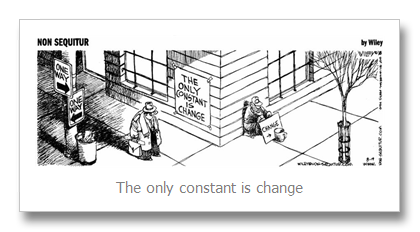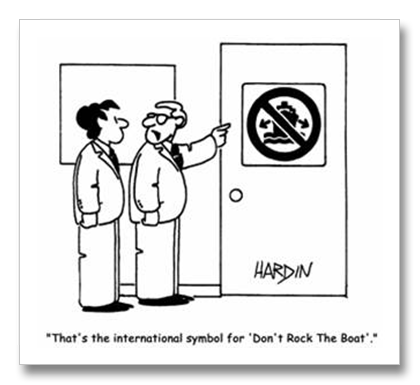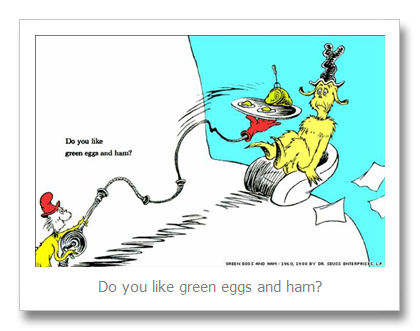Cornerstone Mission Church, Sunday Sermon June 29, 2008
Here are some cartoons about change that I found on the Internet.
- “Change is good, son…” Not when it’s not enough for bus fare.
- “The only constant is change.”
- “That’s the international symbol for ‘Don’t Rock The Boat.’”
- “I’ve seen this before: Combustion due to extreme resistance to change.”
- Then, there is Dr. Seuss’s classic “Green Eggs and Ham” for children.
From very young, one thing that seems to be common for all of us is we don’t like changes especially the changes of uncertain, threatening or stressful natures. We have many reasons for not liking changes. We may get disappointed for not liking changes we make, we may have fear of screwing things up, or we may feel too overwhelmed and stressed that we get paralyzed to make any change, or we are simply too comfortable with the status quo and don’t feel any need to change.
Sometimes aversion or reluctance to change is so strong that we may refuge to change although we know some changes will only make good impact in our lives.
Ironic may be, but it is true, “The only constant is change.” Spiritually speaking, this is true as well. Apostle Paul describes what is norm for Christians in 2 Corinthians 3:18, “And we, who with unveiled glory, are being transformed into his likeness with ever-increasing glory, which comes from the Lord, who is the Spirit.” Christianity is all about change. It begins with the radical change of being justified by faith in Jesus Christ and continues with changes in on-going sanctification again by faith in the power of Jesus Christ to make real differences in us, around us, through us.
One sure way of testing spiritual health is to evaluate your attitude toward change and see what evidences are there for actual on-going change. If there is strong aversion, apathy or fear toward changes God wants to make in your life, if there is no measurable, self-evident changes, then something is not quite right with your spirituality. The way you respond to God who wants to make changes in you reveals a lot about the kind of faith you have.
Today’s short passage speaks to how the early Christians dealt with change God was engineering in their lives. What we see is they didn’t shy away in fear or apathy from making the real change when they knew it was God who wanted to bring about the change.
Charles Swindoll writes, “I’m convinced that living a life of obedience is an impossibility if you and I are unwilling to change.”[1] He explains this way, “Change brings adventure, and adventure stretches your faith. All that spells growth. Growth happens within us when we face risk. Head-on. Faith and risk go hand in hand.”[2]
The journey with Jesus is journey of trusting in Jesus, trusting that he is really smart and knows exactly the kind of changes that will be best for us and have the power to make changes in us.
Ask your self these questions. Do you have faith in the face of God driven change?” Do you welcome changes God wants to make in your life because you are convinced God is far smarter than you will ever be and the changes he seeks in you are what’s best for you?
- God driven change is possible when you welcome God’s vision for you instead your vision for yourself.
Back in chapter 11, we saw how Barnabas began ministering in Antioch where a great number of people believed and turned to the Lord, both the Jews and the Gentiles. He was sent by the Jerusalem church. Seeing the evidence of the grace of God, being glad, and encouraging the new Christians, he enlisted Saul to minister with him. So for a whole year, Barnabas and Saul met with the church and taught great numbers of people according to Acts 11:26.
During this time, a prophet named Agabus came from Jerusalem to Antioch and through the Spirit predicted that a severe famine would spread over the entire Roman world. Responding to this prophecy, the church of Antioch sent Barnabas and Saul to Jerusalem with tangible means to help them deal with the famine that was to hit them hard.
And, at the end of chapter 12, we read, “When Barnabas and Saul had finished their mission, they returned from Jerusalem, taking with them John, also called Mark.”
These two men were instrumental in teaching and nurturing the Antioch church to thrive. They were trustworthy leaders entrusted with the material provisions for the church of Jerusalem by the Antioch church. When they returned, they walked into the vibrant growing church where everything was going great. Along side of these two great leaders were three other, together they were known as prophets and teachers in the church of Antioch.
Barnabas and Saul were in the top of their game sort of speaking. They had everything going for them. Their diligent early work paid off and now being back from delivering much needed relief help to Jerusalem, they were probably ready to dive right back into the life of the church, doing what they did best, teaching them, nurturing them into deeper growth.
But, it was in this context when things were going really well, when everything was taking off and moving along in their ministry at Antioch, when their powerful presence, their gifting in teaching and nurturing were much appreciated, demanded, this is when God decided to move them.
Now, Barnabas and Saul were the most mature and seasoned leaders, believers. Their absence while delivering help to Jerusalem was deeply felt and missed, I am sure. When the Antioch church was envisioning again for these spiritual giants to do great work among them, this is precisely when God initiated his call to send them out for the mission.
If the church of Antioch insisted on their vision of seeing Barnabas and Saul doing greater work in their church over God’s greater vision, if the church resisted the change God was seeking, I wonder how things might have turned out.
What’s certain is that instead of insisting on God to fulfill their own vision, instead of what they thought was good for them they decided that God should have his way with them. What mattered at the end of the day was not whether their dreams, their agendas, their visions got fulfilled. What mattered to them was for God to have his way with them; to see God’s vision come true for them was what mattered to them.
In my desire to see my vision get fulfilled, I felt ambivalent when I first learned what God wanted to do with Shannon and Carol. It was surely a big change for them, but it was also a change for me and for our church. Part of me didn’t want to see them go. But, I knew that God’s great vision was for them to get plugged into the oversea mission work.
When I think about having to send off some of you to the mission fields because God has called you, I know I will feel sad, not wanting to see you go, but I again, I will stand on God’s vision and will rejoice greatly over seeing God making his claim upon you!
We must learn to trust God’s vision for our lives is best for us. No matter what we think is good if it doesn’t align with what God sees as good, it isn’t good.
Real faith embraces changes God wants to make in you.
- God’s driven change is possible when you are praying with humility for God’s vision.
Verse 2 says specifically that the Holy Spirit told them about Barnabas and Saul while they were worshiping the Lord and fasting.
The right context for the Spirit to come and make changes is when you and I are in intimate relationship with the Lord through humble prayer.
Two things that they were doing when the Holy Spirit came to announce his plan for change were ‘worshipping and fasting’.
The Greek verb (leitourgevw) that is translated as ‘worshiping’ in NIV is also translated as “ministering” in NAS. And, when this Greek word is used to translate the Old Testament passages, it is used in the context of priests doing their priestly functions and rituals. And, in the New Testament, the Greek noun (leitourgov") of the same derivative as in Acts 13:2 is also used in the similar context of ministering or serving as priest. Apostle Paul in Romans 15:16 talks about being a minister of Christ Jesus to the Gentiles with the priestly duty of proclaiming the gospel of God. Again, Hebrews 8:2 speaks of Jesus as one who serves as the true high priest in the true tabernacle set up by the Lord, not by man. And, according to a theological dictionary, what is translated as “worshiping” carries the sense of Christian worship in prayer.[3]
So, when the Holy Spirit found the believers in Acts 13:2, the believers were ministering as “believer-priests.” Darrell Bock describes this way. “Here is a church that has seen the need to reach out to the world as its members draw near to God. Their heart has become wedded to God’s calling as a result.”[4] The way the believers served as “believer-priests” was through praying. As believers who were saved by God’s grace, they were now exercising their priestly ministry privilege to pray for others to experience God’s grace as they experienced.
In the Old Testament, often fasting and prayer went together. Fasting was practiced in Israel as a preparation to converse with God as Moses did up on Mount Sinai for forty days and forty nights without eating bread of drinking water (Exodus 34:28). David fasted when he pleaded for the child born when he committed adultery (2 Samuel 12:6). There are many other accounts. The deeper meaning of fasting was an expression of one’s humbling before God.
What we see in Acts is the similar thing. The believers were praying earnestly and fasting was an expression of their earnestness. Fasting in itself has no value in its own right, but only when it is accompanied by the attitude of lowing oneself before God.
Isaiah 57:15 says, “I live in a high and lofty place, but also with him who is contrite and lowly in spirit, to revive the spirit of the lowly and to revive the heart of the contrite.” When our prayer is accompanied by fasting, when the posture assumed before God is of the humility, and when simply calling out to God, “Oh, God, how I need you!” the promise is for God to be with us, to live with us to revive our hearts.
When the believers were praying together, when they were humbly telling God, “we need you so much,” when their fasting expressed their utter dependence on God, that is when the Holy Spirit came down to direct them to the change God desired for them.
Their response to the Holy Spirit who directed them to send out Barnabas and Saul was not complaining or arguing with the Spirit, but their response was to engage in more prayer and more fasting. Now, the purpose of their prayer and fasting was to discern what they heard was indeed from the Holy Spirit.
God wanted a change, a huge change. God had a master plan to reach the far corners of the known world then through Barnabas and Saul. If the believers weren’t praying as believer-priests, if they were not engaging in prayer earnestly with humble attitude expressed in their fasting, they wouldn’t have been able to hear or discern the voice of the Spirit.
Without prayer and humble fasting, they would have gone on with what they thought was God’s will when in fact they were after their own desires, wishes, and vision.
Prayer and humble fasting allowed them to hear the Holy Spirit’s voice for change, to discern God’s will clearly without distortion, and enable them to joyfully submit to God’s vision, the best vision for them.
The result was the very first missionary journey taken by Saul and others to reach the unreached with the gospel.
- Do you desire real changes by God? Find yourself at the cross.
If you don’t find yourself before God, if you don’t find yourself in humble posture before God, the chance of you hearing and discerning the Spirit’s voice to make change will be dismally low.
Where do you begin to experience God driven change in your life? You begin at the foot of the cross. That’s where it all begins for us. That’s where we continue our spiritual journey. At the cross any confidence in your ability to do life on your own, to fulfill your own vision must be shattered. Self confidence must be replaced with the earnest and humble prayer, “Lord, I can’t do life without you. I need you. I need you to change me.” At the cross you must hunger for his presence, his change!
Pray, fast for God driven changes! God will revive you and give you the faith in the face of God driven change.
[1] Charles R. Swindoll, “A Man of Grace and Grit: Paul, Word, 2002, p. 122.
[2] Ibid., p. 131.
[3] NIDNTT, leitourgevw (G3310).
[4] Darrell Bock, Acts: Baker Exegetical Commentary. p. 440.





